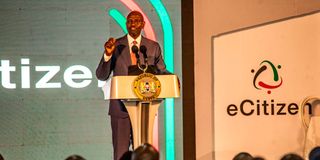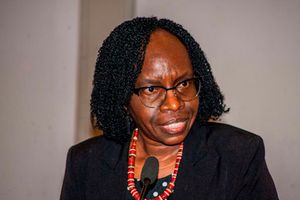
e-Citizen and Webmaster Chief Executive Officer James Ayugi during an interview on February 28, 2025 in Kilimani, Nairobi.
Bernard Ndung’u, the Director-General of accounting services and quality assurance at the National Treasury, called the November 30, 2022 meeting to order at 7.15am, so that everyone in the 14th floor boardroom could introduce themselves.
Mr Ndung’u’s boss and namesake, Njuguna Ndung’u was one of two Cabinet Secretaries representing President William Ruto’s administration in talks with Webmasters Kenya Ltd, aimed at having the private firm surrender the eCitizen platform to the government.
Prof Ndung’u, then the Treasury CS, was accompanied by his Information, Communication and Digital Economy counterpart Eliud Owalo.
For nearly six years, preceding this meeting led by two Cabinet members, there had been a Mexican standoff over the ownership and control of eCitizen.
The Uhuru Kenyatta administration had been relying on contracts and World Bank documents to claim ownership of the platform, which has grown into an integral part of the government’s service delivery.
Webmasters, on its part, held that the product it developed in 2014 had only 10 services, and by being directed to onboard thousands of others, it had morphed eCitizen into a different entity for which the government had to pay.
By the time Mr Kenyatta was retiring from office on September 13, 2022, a court case on the ownership and control of both eCitizen and the convenience fees derived from it was in court, where Webmasters founder and CEO James Ayugi once hinted at shutting down the system if his firm was not paid.
The case was filed by Goldrock Capital, a firm that Webmasters illegally hired to collect funds from service seekers on behalf of government, seeking the convenience fees collected prior to being kicked out by the Treasury in 2017.
The suit snowballed into a storm for government as Webmasters also sought payment as the case proceeded.

President William Ruto during the launch of e-Citizen services, GavaMkononi app and Gava Express at KICC in Nairobi on June 30.
Shortly after being sworn in, President Ruto had summoned owners of the firm, led by Mr Ayugi, to a meeting at State House where one message was made perfectly clear – that Webmasters hand over the eCitizen platform to government and abandon any monetary claims as the firm had paid itself enough from convenience fees for nearly eight years.
Financial claims
In January 2023, Goldrock and Webmasters dropped their financial claims and the suit was withdrawn. Busia senator Okiya Omtatah had joined the suit to challenge the convenience fees’ legality and was forced to file a separate cause on account of the withdrawal.
The meeting at the boardroom on the Treasury building’s 14th floor in 2022 was a follow-up intended to implement President Ruto’s directive.
Minutes of the 2022 State House and Treasury meetings are revealed in court papers filed by Treasury PS Chris Kiptoo in February, 2024 in response to a suit by an activist challenging a directive that school and university fees be paid through eCitizen.
Also in the Treasury building boardroom were Water PS Paul Rono, ICT Authority CEO Stanley Kamanguya, State counsels Emmanuel Kiarie and Christopher Maina as well as CBK deputy director Eunice Koiyani.
Konza Technopolis sent corporation secretary Gladys Koletit and ICT manager Lucas Omollo.
On the other end of the table, for Webmasters Kenya Ltd, were directors Mr Ayugi, Evid Sibi and David Kiprono.
Moments after Mr Ndung’u called the meeting to order, the attendees were informed of the State House meeting with the President and its resolutions.
It was resolved that the convenience fees collected would now go straight into the Consolidated Fund – the bank account where all money collected by government meets.
It was further resolved that Webmasters Kenya Ltd transfer everything eCitizen to the State, including front-end and back-end rights to the system, and then train government staff on operating the service delivery platform.
That resolution was to apply to Webmasters’ sister firms, Pesaflow Ltd and Olive Tree Ltd, which have been facilitating money movement from customers to government and messages to both parties in service transactions respectively.
This handover was to happen in four stages. A setup of a physical space stocked with relevant tools was to be done by January 27, 2023.
Documents such as the system’s source code, system architecture, user manual and others were to be handed over by February 3, 2023.
System audit
A system audit and remedial actions were to be completed by February 24, 2023.
Finally, capacity building including training of government staff by Webmasters was to be done by July 13, 2023.
The government was to reserve the right to inspect and ensure that everything had been handed over.
After the handover, the government was at liberty to contract either Webmasters or any other vendor, specifically for maintenance and support works, but on a fixed-term contract.
Additionally, the meeting resolved to abolish convenience fees starting December 1, 2022.
Convenience fees are charged for each transactions, at either Sh50 for Kenyans, or $1 for foreign nationals such as expatriates seeking documents like work permits.
“It was agreed that the vendor supporting the system would be remunerated through contractual arrangements based on services rendered and the same be procured in accordance with the Public Procurement and Assets Disposal Act, 2015… Resolution: That the convenience fees being charged on the eCitizen portal services be abolished with effect from December 1, 2022,” the minutes of the meeting read in part.
In line with the resolutions, the Interior ministry spent millions hosting at least 62 people from different agencies and trainers from Webmasters and other private firms at the PrideInn Paradise Beach Resort, Mombasa County for an eight-day eCitizen workshop starting April 18, 2023.
Jambopay founder and Safaricom workers were among the trainers.
Room rates average Sh24,000 at the hotel, which means taxpayers spent at least Sh11.9 million on bed and breakfast charges alone for the eight days. Other meals and transport to and from Mombasa may have pushed the cost past the Sh12 million mark.
The workshop was intended to sensitize the government workers on onboarding of services on the eCitizen platform.
It is one of many such workshops that have been held since the handover agreement was signed in 2022.
But nearly two years later, Webmasters and its sister firms are still operating eCitizen on behalf of government.
The Webmasters group is pocketing from convenience fees and then, separately from maintenance charges, the latest report by Auditor-General Nancy Gathungu, for the financial year to June, 2024, has revealed.
In that period, the private firms received Sh591.9 million from convenience fees and a further Sh857 million in maintenance fees – a cumulative Sh1.45 billion.
Ms Gathungu in her audit held that the Webmasters group has no backup, hence government services and, arguably, the economy would grind to a halt in the event of a cyberattack targeting eCitizen.
Further, Ms Gathungu raised concerns on the handling of all the data on eCitizen by private firms with government having “little control”.
Last week, Mr Ayugi appeared on a local radio show to discuss matters eCitizen, an indication of his firm’s continued operation of the portal.
In a past interview the Business Daily, Mr Ayugi said that his group bills the government between Sh100 million and Sh200 million every month.
Mr Kiptoo made disclosures on the 2022 State House and Treasury meetings in response to a suit by activist Benjamim Magare Gikenyi.
In the suit, Dr Gikenyi challenged a directive that school and university fees be paid through eCitizen.
Treasury, Interior, ICT, and Education Cabinet Secretaries are listed as respondents alongside the Kenya Revenue Authority and the Attorney-General.
Dr Kiptoo in response claims that the suit has been filed based on misconceptions, and has filed the various documents to aid his defence.









